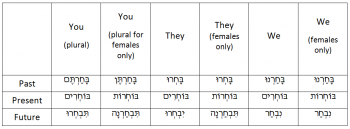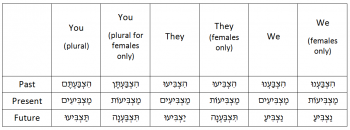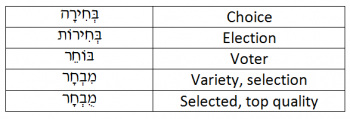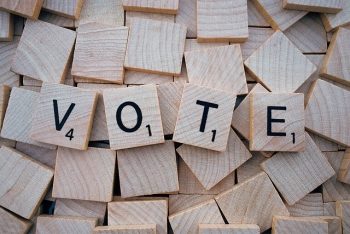How to Use the Hebrew Verbs to Elect, to Vote Posted by Ayana on Feb 17, 2020 in Grammar
For the third time in under a year, Israelis are heading back to the polls. Efforts to form a government failed again after the second election held in September 2019. The unprecedented third election will be held on March 2nd 2020. We’ve already learned the relevant vocabulary of Israel political deadlock, in these posts:
What to Know Before the Israeli General Elections
Israel Second Election in 2019
Behind the Scenes of Israel 2019 Election
Now it’s time to delve into the specific verbs for the election day. Two Hebrew verbs are used in this event. The infinitive verb לִבְחוֹר (liv-hor) means to elect, and also to choose, to select, to pick. And the infinitive verb לְהַצְבִּיעַ (le-atz-bi-a) means to vote, and also: to raise one’s hand, to point at, to indicate. Pay attention to the different meaning of the two verbs in the following sentences:
בִּיקַּשְׁתִּי מִמֶּנוּ לִבְחוֹר פְּרָחִים לְשַׁבָּת.
I asked him to pick flowers for Saturday.
הַתַּלְמִידִים הִתְבַּקְּשׁוּ לִבְחוֹר בֵּין צַרְפָתִית לְעֲרָבִית בְּתוֺר שָׂפָה שְׁנִיָּיה.
The students were asked to choose between French and Arabic as a second language.
הַמַּאֲמָר הַזֶּה יַעֲזוֹר לְךָ לִבְחוֹר אֶת הַשִּׁיטָה שֶׁמַּתְאִימָה לְךָ.
This article will help you choose the right method for you.
כָּל אֶזְרָח יִשְׂרְאֵלִי בֶּן שְׁמוֹנֶה עֶשְׂרֵה שָׁנָה וָמַעְלָה זַכַּאי לִבְחוֹר לַכְּנֶסֶת.
Every Israeli citizen who is eighteen years of age or older is eligible to vote for the Knesset.
תַּלְמִיד שֶׁרוֹצֶה לְדַבֵּר בַּכִּיתָּה צָרִיךְ לְהַצְבִּיעַ.
A student who wants to speak in class should raise his hand.
זֶה לֺא מְנוּמָּס לְהַצְבִּיעַ עַל אֲנָשִׁים בָּרְחוֺב.
It’s not polite to point at people on the street.
תַּפְקִידֵנוּ כְּאֶזְרָחִים לְהַצְבִּיעַ גַּם עַל הַכְּשָׁלִים.
Our role as citizens is to point out the failures as well.
אֲנִי קוֺרֵא לְאֶזְרְחֵי יִשְׂרָאֵל לָצֶאת וּלְהַצְבִּיעַ לַמּוֺעֳמָד הָרָאוּי בְּעֲינֵיהֶם.
I urge the citizens of Israel to go out and vote for the candidate they believe is worthy.
—————————————————————————————————————————
When using the verb לְהַצְבִּיעַ (to vote), the preposition לְ (for) should appear before the direct object. לְהַצְבִּיעַ (to vote) + לְ (for) + object. For example:
לְהַצְבִּיעַ לַמִּפְלָגָה הַחֲדָשָׁה.
To vote for the new party.
לְהַצְבִּיעַ לַמַּנְהִיג הַנָּכוֺן.
To vote for the right leader.
לְהַצְבִּיעַ לְמַעַן מַטָּרָה חֲשׁוּבָה.
To vote for an important cause.
לְהַצְבִּיעַ לָהּ.
To vote for her.
When using the verb לִבְחוֹר (to elect), two terms can follow to indicate a direct object: בְּ and אֶת. The terms can be omitted as well. לִבְחוֹר (to elect) + (בְּ / אֶת) + object. For example:
לִבְחוֹר בַּמִּפְלָגָה הַחֲדָשָׁה.
To elect the new party.
לִבְחוֹר מַנְהִיג מַתְאִים.
To elect a right leader.
לִבְחוֹר אֶת הַמַּטָּרָה הַחֲשׁוּבָה.
To choose the important goal.
לִבְחוֹר בָּהּ.
To elect her.
The root of the verb לִבְחוֹר is ב-ח-ר, and it belongs to binyan pa’al. It’s conjugated as follows:


For example:
אַל תִּבְחַר בַּמּוֺעֳמָד הַכָּרִיזְמָטִי, תִּבְחַר בַּמּוֺעֳמָד שֶׁיָכוֺל לְהַנְהִיג מְדִינָה.
Don’t choose the charismatic candidate, choose the candidate who can lead a country.
הַמִּפְלָגָה בָּחְרָה בּוֺ לְמַנְהִיג.
The party elected him as leader.
הֵם מְאוֹד נֶאֱמָנִים, הֵם תָּמִיד בּוֹחְרִים בּוֺ.
They are very loyal; they always vote for him.
The root of the verb לְהַצְבִּיעַ is צ-ב-ע, and it belongs to binyan hiph’il. It’s conjugated as follows:


For example:
אֲנִי לֺא הִצְבַּעְתִּי בַּבְּחִירוֹת הַקּוֹדְמוֹת. אַתָּה הִצְבַּעְתָּ?
I didn’t vote in the last election. Did you?
הִיא תָּמִיד מַחְלִיטָה לְמׅי הִיא מַצְבִּיעָה בָּרֶגַע הָאַחֲרוֹן.
She always decided who to vote for in the last minute.
יֵשׁ אֲנָשִׁים שֶׁדָּבָר לֺא יְשַׁנֶּה אֶת דַּעֲתָם, הֵם יַצְבִּיעוּ לוֺ וִיהִי מָה.
There are people that nothing will change their mind, they will vote for him no matter what.
—————————————————————————————————————————
The root of the verb לִבְחוֹר is ב-ח-ר. From this root derives the following words:

The root of the verb לְהַצְבִּיעַ is צ-ב-ע. From this root derives the following words:

For example:
הַצְבָּעָה לַכְּנֶסֶת הׅיא זְכוּתוֹ הַדֵּמוֹקְרָטִית שֶׁל כָּל אֶזְרָח מְעַל גׅיל 18.
Voting for the Knesset is the democratic right of every citizen over the age of 18.
הַבּוֹחֲרִים רַשָּׁאִים לְהַבִּיעַ אֶת דַּעֲתָם.
Voters are allowed to express their opinions.
הַבְּחִירוֹת מִתְקָרְבוֹת וְהַמַּאֲבָק עַל קוֺלוֺת הַמַּצְבִּיעׅים מִתְגַּבֵּר.
Elections are approaching and the fight for votes increases.
—————————————————————————————————————————
Keep Calm and Vote!

Build vocabulary, practice pronunciation, and more with Transparent Language Online. Available anytime, anywhere, on any device.




